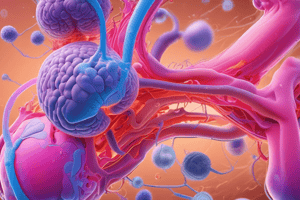Podcast
Questions and Answers
What is the process by which blood is filtered through the glomeruli into Bowman's capsule, creating urine?
What is the process by which blood is filtered through the glomeruli into Bowman's capsule, creating urine?
- Tubular reabsorption
- Renal blood flow
- Glomerular filtration (correct)
- Tubular secretion
Which of the following substances can be actively secreted into the urine by specialized cells in the nephron segments?
Which of the following substances can be actively secreted into the urine by specialized cells in the nephron segments?
- Electrolytes like sodium and potassium
- Proteins
- Glucose
- Organic acids like amino acids (correct)
What is the typical range of glomerular filtration rate (GFR) in healthy adults?
What is the typical range of glomerular filtration rate (GFR) in healthy adults?
- 60-90 mL/min
- 120-150 mL/min
- 30-60 mL/min
- 90-120 mL/min (correct)
Which of the following factors can influence the glomerular filtration rate (GFR)?
Which of the following factors can influence the glomerular filtration rate (GFR)?
Which of the following segments of the nephron is responsible for the reabsorption of substances from the urine?
Which of the following segments of the nephron is responsible for the reabsorption of substances from the urine?
Which of the following processes is not directly involved in renal physiology?
Which of the following processes is not directly involved in renal physiology?
Which mechanism ensures that blood containing waste products enters the nephrons while providing oxygen and nutrients for proper kidney function?
Which mechanism ensures that blood containing waste products enters the nephrons while providing oxygen and nutrients for proper kidney function?
Which process involves the active transport of essential molecules like water, glucose, and amino acids back into the bloodstream?
Which process involves the active transport of essential molecules like water, glucose, and amino acids back into the bloodstream?
What is the process by which the kidneys regulate electrolytes like sodium and potassium, maintain acid-base balance, and control blood pressure?
What is the process by which the kidneys regulate electrolytes like sodium and potassium, maintain acid-base balance, and control blood pressure?
Which mechanism allows renal blood flow to adjust and maintain constant perfusion pressure, essential for normal kidney function?
Which mechanism allows renal blood flow to adjust and maintain constant perfusion pressure, essential for normal kidney function?
Which process involves the removal of waste products and excess water from the blood into the nephron?
Which process involves the removal of waste products and excess water from the blood into the nephron?
Which process involves the active transport of waste products and drugs from the blood into the nephron?
Which process involves the active transport of waste products and drugs from the blood into the nephron?
Flashcards are hidden until you start studying
Study Notes
Renal Physiology: An Overview
Introduction
Renal physiology refers to the processes that regulate the functioning of the kidneys. The kidneys play a crucial role in maintaining the body's internal environment, including filtration, acid-base balance, electrolyte homeostasis, and other essential functions. This article provides an in-depth look into various aspects of renal physiology, focusing on several key topics: glomerular filtration, tubular secretion, tubular reabsorption, renal blood flow, and kidney function regulation.
Glomerular Filtration
Glomerular filtration is a process that occurs in the kidney's nephrons, where the blood is filtered through tiny blood vessels (glomeruli) into Bowman's capsule, creating urine. The rate of filtration is determined by the glomerular filtration rate (GFR), which can vary depending on factors like age, sex, and certain medical conditions. Typically, the GFR ranges between 90-120 mL/min in healthy adults.
Tubular Secretion
Following filtration, urine travels through various segments within the nephron, including the proximal tubule, loop of Henle, distal convoluted tubule, collecting duct, and finally into the renal pelvis or calices. Some substances can be actively secreted into the urine by specialized cells in these segments, such as organic acids like amino acids, drugs, or metabolites.
Tubular Reabsorption
Concurrently, other essential molecules, like water, glucose, amino acids, vitamin D, calcium, potassium, chloride, and sodium, must be conserved and transported back to the bloodstream via active transport. This process, known as tubular reabsorption, occurs throughout the nephron but is primarily driven by the thick ascending limb of the loop of Henle and the cortical collecting ducts.
Renal Blood Flow
Renal blood flow plays a critical role in maintaining kidney function. It ensures that blood containing waste products enters the nephrons while providing oxygen and nutrients for proper functioning. Renal blood flow autoregulates, meaning it adjusts to maintain constant perfusion pressure, which is essential for normal kidney function. This regulation involves mechanisms such as myogenic tone, tubuloglomerular feedback, and local effects of vasoactive agents like prostaglandins.
Kidney Function Regulation
The kidneys maintain the body's internal environment by regulating electrolytes (e.g., sodium, potassium), acid-base balance via hydrogen ion secretion, and blood pressure through renin-angiotensin-aldosterone system activation. Renal function can also be influenced by factors such as corticosteroids, calcium entry blockers, or specific dietary components like vitamin C.
In summary, renal physiology is a complex process involving various interconnected mechanisms to maintain homeostasis within the human body. Understanding these processes helps healthcare professionals diagnose and treat various kidney disorders effectively.
Studying That Suits You
Use AI to generate personalized quizzes and flashcards to suit your learning preferences.




